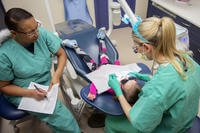With a new year on the horizon, Tricare enrollment fees and copays will be changing in 2020.
By law Tricare fees go up slightly every year. For retirees the cost bump is tied to the annual cost of living increase (COLA), while other fee increases are set ahead of time by Congress.
While the changes are small, the costs do go up for many Tricare recipients. Here’s a break down.
Tricare Prime
While active duty family members pay no enrollment fee for Tricare Prime, the annual fee for retirees who entered the service before 2018 and their dependents will increase from $297 annually to $300 for individual coverage while family coverage will go from $594 to $600.
For those retirees who entered the service after Jan. 1, 2018 and their beneficiaries the annual premium for individual coverage will go from $360 to $366 while the family plan will increase from $720 to $732.
Some copayments will increase as well; specialty and urgent care visits will cost $1 more in 2020.
Tricare Prime users who are medically retired or survivors do not see an increase.
Read more about 2020 Tricare Prime costs.
Tricare Select
Just like Tricare Prime, active duty family members enrolled in Tricare Select pay no enrollment fees. All others will see a slight fee increase in 2020.
While retirees who entered service before 2018 pay no enrollment fee, retirees who joined the service in 2018 or later will see an increase from $462 to $471 for individual coverage and $924 to $942 for family coverage.
Some copayments will see slight increases as well. Active duty family members of those who entered before 2018 as well as all Tricare Reserve Select participants will see primary care visits go up by $1 - from $21 to $22, and specialist visits will increase $2 each, from $31 to $33. Those who entered in 2018 or later will see a $1 increase in specialist visits.
Full details on 2020 Tricare Select costs.
Tricare Reserve Select
Reservists enrolled in Tricare Reserve Select will see their monthly payments increase from $42.83 to $44.17 for individual coverage and from $218.01 to $228.27 for family coverage.
Tricare Retired Reserve
Retired reservists who haven't turned 60 and are covered under the Tricare Retired Reserve program will benefit from a rate decrease in 2020. The monthly premium for an individual retiree will decrease from $451.51 to $444.37, and those with family coverage will see a monthly decrease from $1,083.40 to $1,066.26.
Tricare Young Adult
College-age dependents enrolled in the Tricare Young Adult program will see an increase in their monthly premiums; however, the amounts vary depending on which option they are covered under. For those using Tricare Young Adult Select, the monthly payment will go from $214 to $228, and those using Tricare Young Adult Prime will see the monthly payment increase from $358 to $376.
Continued Health Care Benefit Program (CHCBP)
Recently discharged members with temporary health insurance under the Continued Health Care Benefit Program (CHCBP) will see their premiums increase by the largest amount. Those who have single coverage will be hit with a premium increase from $484.33 to $517.67 each month, and those electing family coverage will pay an additional $75.67 each month, increasing their premiums from $1,091 to $1,166.67.
Tricare Pharmacy Costs
Prescription drug costs for Tricare users are also set to rise Jan. 1, some by as much as 42%. The pharmacy fee increases impact all Tricare users who utilize off-base pharmacies, including those on Tricare for Life.
Effective Jan. 1, 2020, a 90-day supply of generic drugs received through the program's Express Scripts mail-order pharmacy will increase from $7 to $10. Co-pays on brand-name drugs received through the mail will go from $24 to $29; the price rises from $53 to $60 for non-formulary drugs.
Generic drug prescriptions filled at retail pharmacies will see the cost rise from $11 to $13 for a 30-day supply, while the same supply of brand-name medications will increase from $28 to $33. Non-formulary drugs -- those not on Tricare's list of fully covered medications -- will go up from $53 to $60.
Prescriptions filled on base will continue to have no cost to members.
Read more about 2020 Tricare pharmacy fees.
Keep Up with Changes to Tricare and Your Other Benefits
Want to know about changes in military benefits as they happen? Sign up for a free Military.com membership to get the latest benefits news delivered directly straight to your inbox.















